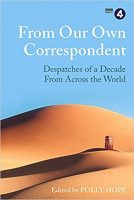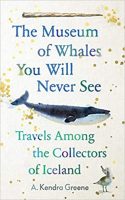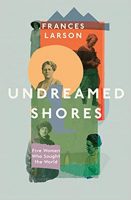 I’ve just been reading of a conversation between two sisters in Portugal who are having to distance from each other. One says: “At least we can Facebook.” To which the other responds: “You can’t hug on Facebook.”
I’ve just been reading of a conversation between two sisters in Portugal who are having to distance from each other. One says: “At least we can Facebook.” To which the other responds: “You can’t hug on Facebook.”
The exchange is not from 2020 but from 2013. The sisters are being parted not by the threat of Covid-19 but by the Great Recession that followed the financial crisis of 2007-8. That forced many Portuguese, unable to find work at home, to beg for jobs in former colonies such as Angola, Mozambique and Brazil.
The story of the sisters, told by Emma Jane Kirby, appears in From Our Own Correspondent: A Decade of Dispatches From Across the World, which is due to be published on Thursday (Weidenfeld & Nicolson). Polly Hope, a producer who has edited this compilation from the long-standing BBC radio programme, notes that the financial crisis has been one of four big stories that have featured regularly over the past 10 years, along with the Arab Spring and its aftermath, the war in Syria and the surge in migration to Europe during 2014 and 2015. In addition, she says, there were larger-scale narratives that will “surely affect far more lives in their time”. Among those are the rise as a superpower of China, climate change, and the formation of “new landscapes of the earth as human consumption [threatens] entire cultures, species and ecosystems”.
Her purpose, though, is not to provide a digest of the biggest stories. Her book, like those radio dispatches from which it springs, is “more like a compilation of personal snapshots: of those telling moments and revealing details which throw an intimate light on how the world is changing”. And sometimes on how it isn’t.
Kim Chakanetsa, reporting from Zimbabwe in 2018, six months after Robert Mugabe was edged out of power, is struck by how many fewer roadblocks there are on the way from the airport to Harare; roadblocks at which police used to fill their pockets with “fines” levied on drivers for having dirty vehicles and even torn car seats. “Now that is a change,” she says. Pumza Fihlani, who grew up in the Eastern Cape, reports (again in 2018) on the results of a drought in Cape Town, where residents have been asked to limit their shower time to two minutes. There are still townships here, she notes, “where a shower of any length at all would be considered a luxury… the race and class divides enforced by apartheid are still evident today.”
Contributors to From Our Own Correspondent are encouraged, Hope says, to “zero in on the moments which made the deepest impression on them. That personal touch is what makes the finest dispatches… really sing.” Here’s a perfect example, from Nick Thorpe, reporting in 2015 from a refugee camp near Lendava, Slovenia: “My nose starts streaming in the cold. A small boy notices, and hands me his little packet of tissues. I take one, hesitantly, from his five; 20 per cent, perhaps, of his worldly possessions.”
Other books touching on travel and place and due to be published shortly include the following:
The Museum of Whales You Will Never See by A Kendra Greene (Granta, July 2)
 Iceland is home to only 330,000 people but to more than 265 museums and public collections, most of them established in the past 20 years. They range from the Phallological Museum, which houses the penises of Icelandic mammals, to the Museum of Icelandic Sorcery and Witchcraft. Greene, an essayist, printer and maker of artist’s books (who lives in Dallas, Texas), travels the country to tell the stories behind the collections. The proof I was sent came with an endorsement from Malachy Tallack, author of Sixty Degrees North: “A delightful, lyrical tribute to those who gather, record and preserve. This is a book brought to life by its own subject matter: by curiosity, obsession and the desire to share with others our own sense of wonder.”
Iceland is home to only 330,000 people but to more than 265 museums and public collections, most of them established in the past 20 years. They range from the Phallological Museum, which houses the penises of Icelandic mammals, to the Museum of Icelandic Sorcery and Witchcraft. Greene, an essayist, printer and maker of artist’s books (who lives in Dallas, Texas), travels the country to tell the stories behind the collections. The proof I was sent came with an endorsement from Malachy Tallack, author of Sixty Degrees North: “A delightful, lyrical tribute to those who gather, record and preserve. This is a book brought to life by its own subject matter: by curiosity, obsession and the desire to share with others our own sense of wonder.”
Owls of the Eastern Ice by Jonathan C Slaght (Allen Lane, July 2)
 The publisher describes this as “a breathtaking portrait of Russia’s remote far eastern forest, and of the world’s most extraordinary owl”. That forest is in the province of Primorye, where Russia, China and North Korea meet in a tangle of mountains and barbed wire. The owl is the Blakiston’s fish owl, the world’s biggest, which Slaght, a wildlife researcher and conservationist based in Minneapolis, in the United States, first saw in 2000: “Backlit by the hazy grey of a winter sky, it seemed almost too big and too comical to be a real bird, as if someone had hastily glued fistfuls of feathers to a yearling bear, then propped the dazed beast in a tree.” The story of his attempt to save the bird from extinction is, the publisher says,” a timely meditation on our relationship with the natural world and on what it means to devote one’s career to a single pursuit”.
The publisher describes this as “a breathtaking portrait of Russia’s remote far eastern forest, and of the world’s most extraordinary owl”. That forest is in the province of Primorye, where Russia, China and North Korea meet in a tangle of mountains and barbed wire. The owl is the Blakiston’s fish owl, the world’s biggest, which Slaght, a wildlife researcher and conservationist based in Minneapolis, in the United States, first saw in 2000: “Backlit by the hazy grey of a winter sky, it seemed almost too big and too comical to be a real bird, as if someone had hastily glued fistfuls of feathers to a yearling bear, then propped the dazed beast in a tree.” The story of his attempt to save the bird from extinction is, the publisher says,” a timely meditation on our relationship with the natural world and on what it means to devote one’s career to a single pursuit”.
Undreamed Shores: The Hidden Heroines of British Anthropology by Frances Larson (Granta, July 2)
 Frances Larson describes herself as an anthropologist “who travels to places long ago rather than to places far away”. Her last book was Severed: A History of Heads Lost and Heads Found. In Undreamed Shores, she tells of the lives and deaths of Britain’s first female anthropologists, who did go to places far away. All of them trained at Oxford, in the opening decades of the 20th century, and led ground-breaking research in their fields. “Katherine Routledge commissioned her own boat and sailed to Easter Island… Maria Czaplicka risked her health to trek more than 3,000 miles through a frozen Siberian winter in search of nomadic reindeer-herders who had never before seen a European woman. Winifred Blackman spent 19 consecutive field seasons living with the agricultural peasants of Upper Egypt. Barbara Freire-Marreco went to work in the pueblos of New Mexico and Arizona. And Beatrice Blackwood, ignoring all advice, travelled into the New Guinea interior to live with warriors who still made their weapons from wood and stone.”
Frances Larson describes herself as an anthropologist “who travels to places long ago rather than to places far away”. Her last book was Severed: A History of Heads Lost and Heads Found. In Undreamed Shores, she tells of the lives and deaths of Britain’s first female anthropologists, who did go to places far away. All of them trained at Oxford, in the opening decades of the 20th century, and led ground-breaking research in their fields. “Katherine Routledge commissioned her own boat and sailed to Easter Island… Maria Czaplicka risked her health to trek more than 3,000 miles through a frozen Siberian winter in search of nomadic reindeer-herders who had never before seen a European woman. Winifred Blackman spent 19 consecutive field seasons living with the agricultural peasants of Upper Egypt. Barbara Freire-Marreco went to work in the pueblos of New Mexico and Arizona. And Beatrice Blackwood, ignoring all advice, travelled into the New Guinea interior to live with warriors who still made their weapons from wood and stone.”
Sarah Moss, author of Ghost Wall, says Undreamed Shores is “a vivid and moving history… sensitively told and rigorously researched”.

Leave a Reply